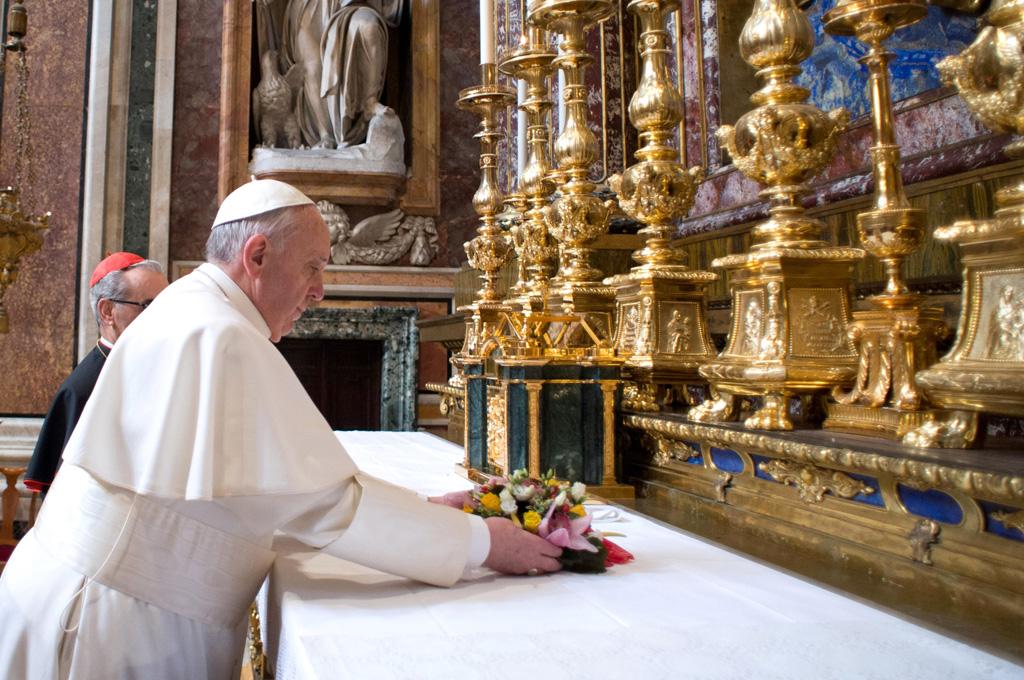How the media failed to predict the next pope
Jorge Mario Bergoglio attends his first private Mass as Pope Francis in the Basilica of Santa Maria Maggiore on March 14, 2013 in Rome, Italy.
BOSTON — Like most newsrooms, GlobalPost covered yesterday’s announcement of a new pope as the story broke, frantically receiving calls and posts from our correspondent in Rome, updating our live blog and readying profiles of the supposed frontrunners. But when the new leader of the Catholic Church stepped onto that balcony, we were surprised at the pick.
In the days leading up to the selection, we had profiled Cardinal Odilo Scherer from Brazil, and Cardinal Francis Arinze from Nigeria. We were ready to publish on Italy’s Cardinal Angelo Scola. But Cardinal Jorge Bergoglio was not really on our radar.
As it turns out, he wasn’t on others’ radar either. On March 11, Business Insider listed frontrunners as Cardinal Angelo Scola, Odilo Pedro Scherer and Marc Ouellet. MSNBC listed Scola, Scherer, O'Malley and Dolan. On the March 11 episode of All Things Considered, NPR said there was no clear frontrunner, but the report mentioned the names Scherer, Scola, Erdo, Schoenborn, Dolan and O’Malley. A March 10 New York Times piece mentions many of those names as well, but not Bergoglio.
A study by psychology professors at the College of William and Mary attempted to predict the next pope based on facial responses to photos of the leading 20 candidates, and their prediction was incorrect. There was even a website created called "Fantasy Pope,” where the public could submit their predictions. Bergoglio wasn’t on the prediction tracker.
A March 3 National Catholic Reporter profile of Bergoglio was one of the few published in the days just ahead of the election.
This despite the fact that Bergoglio was reportedly the runner-up during the last conclave, and the media profiled him several times ahead of the selection of Pope Benedict in 2005. Maybe the media's problem wasn’t that we predicted incorrectly, but that we tried to predict the outcome at all.
Nate Silver, the statistician and blogger for the New York Times who accurately predicted how every state would vote in the 2012 election, had it right: he abstained from predicting.
On March 4, Nate Silver's FiveThirtyEight blog announced that it would not be handicapping the conclave, because there are no scientific polls, little public information and no standardized variables to analyze.
"So everyone following the conclave, from mildly interested observers to bettors to observant Catholics, is left to piece together fragments of information, much of it of dubious quality," wrote David Leonhardt in FiveThirtyEight on March 12.
George Weigel, senior fellow at the Ethics and Public Policy Center, has a name for the trend. "The Pignedoli Principle" is named after Cardinal Sergio Pignedoli, who the media incorrectly predicted would be elected pope in 1978. Weigel published the theory in 2001 that there is an inverse relationship between the number of times a Cardinal is predicted to win the papacy and his chance of actually winning.
"The more he’s papabile in the media," wrote Weigel, "the less he’s papabile in reality."
Every day, reporters and producers at The World are hard at work bringing you human-centered news from across the globe. But we can’t do it without you. We need your support to ensure we can continue this work for another year.
Make a gift today, and you’ll help us unlock a matching gift of $67,000!
